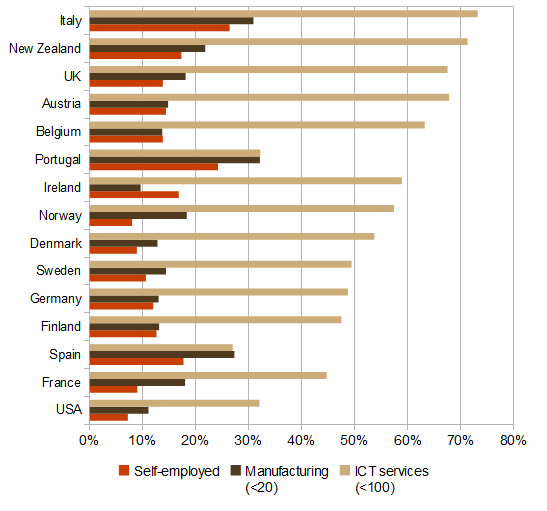In a recent short paper published through the CEPR, John Schmitt and Nathan Lane compare self-employment and employment by small business internationally. In it, they question that part of US national identity built around the idea of each being able to set up their own business, their patch of the American dream. Consider, for example, this excerpt from a May 2009 speech by President Obama:
We honor the entrepreneurs and small business owners who are the engine of our economy. Their ingenuity and hard work are critical to our Nation’s prosperity… Small businesses will lead the way to prosperity, particularly in today’s challenging economic environment…. Our Nation’s success depends on America’s small businesses and entrepreneurs.
Or the 2008 Republican party platform:
We proudly call ourselves the party of small business because small businesses are where national prosperity begins. Small businesses such as Main Street retailers, entrepreneurs, independent contractors, and direct sellers create most of the country’s new jobs and have been the primary means of economic advancement by women and minorities.
The evidence behind these assertions is, at best, mixed, however. Key findings about the USA in the paper include:
- It has the second lowest share of self-employed workers in the OECD.
- It has among the lowest shares of employment in small businesses in manufacturing.
- It has a much lower share of employment by small business in computer-related services and R&D.
Admittedly, the authors are not sure whether this indicates that entrepreneurship is not being captured by the employment measures they choose, but they suspect that the US indeed does have something to learn from other OECD economies about how to promote small business.
The graph below shows three key metrics used by the paper: the percentage of people self-employed, the percentage of workers in manufacturing who work in enterprises of less than 20 employees, and the percentage in computer-services working in enterprises of less than 100 employees.

While the overall finding for the US is interesting, some important non-US findings also emerge:
- The countries with the biggest role for SMEs by these measures come not from one particular economic model, but rather across a variety of different ones, including Mediterranean (Italy), Anglo-Saxon (UK, New Zealand) and Central European (Austria, Belgium).
- For Spain and Portugal, while they have some of the highest figures self-employment and small manufacturing, employment in ICT services is dominated by larger firms.
- In Ireland, it is manufacturing that is dominated by larger firms, while employment by smaller ICT enterprises amounts to 60% of total employment in that sector.
The only problem with the above statistics is their currency. Some date from the early part of this decade, some from the later. Hopefully, the next five years will see the revolution in statistics continue, both in the statistics that are produced, with OECD Explorer and the new Eurostat website showing the greater depth and breadth of statistics that we can expect, and in how we interpret statistics, including IBM Manyeyes and Google Fusion.
Dan ,
The US does not promote small business. It seeks to destroy them in my opinion.